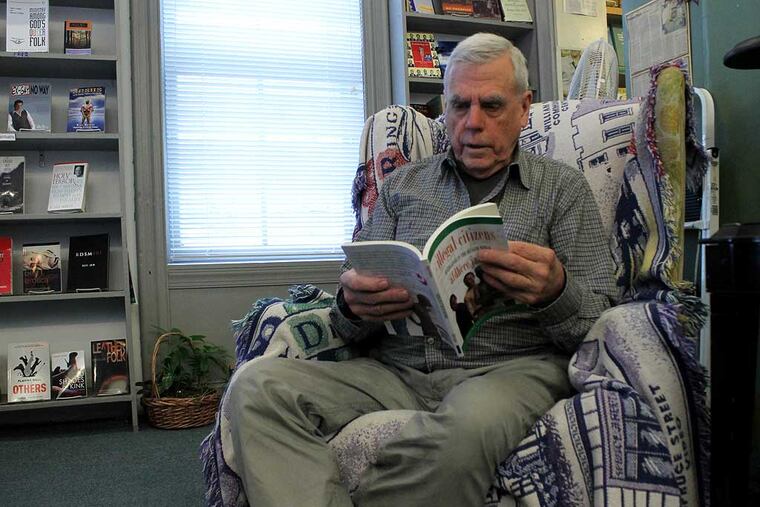Trailblazing gay bookstore Giovanni's Room to close
CENTER CITY It has been a long, steady decline, one that Giovanni's Room owner Ed Hermance did not envision when his bookstore seemed headed toward $1 million in sales from its home at 12th and Pine Streets.

CENTER CITY It has been a long, steady decline, one that Giovanni's Room owner Ed Hermance did not envision when his bookstore seemed headed toward $1 million in sales from its home at 12th and Pine Streets.
The trailblazing niche retailer of gay-themed books was riding so high in 1992, it had $100,000 in inventory and wholesaled to Europe, Australia, and New Zealand.
"In one year, we sold books to 88 bookstores in 17 countries," he said.
The Internet, however, has been relentless in its gradual destruction of the store and cultural landmark. So, come mid-May, Giovanni's Room - one of the nation's few such bookstores - will close, ending its run as an oasis for gays in search of literature, and even shelter during more hostile years gone by.
A touchstone when it opened in the 1970s with just a few dozen books, the store will close around May 17 after years of unprofitably trying to withstand relentless competition from the Web.
When it leaves, only one other long-standing gay-themed book retailer will remain - Calamus Book Store in Boston, whose own longevity seems threatened by the forces that doomed Giovanni's Room.
"Basically, I'm reducing inventory because the writing is on the wall," Calamus owner Brian Gale said Tuesday about the imminent loss of Philadelphia's landmark, news of which had traveled up the Northeast Corridor to his basement store.
Hermance was equally blunt a day earlier in describing his store's struggles against the oft-repeated refrain, "Oh, I'll get it online."
"We have not been able to make a profit for many years," said Hermance, 73, who had been working without pay for years and paying the bills at his Powelton Village home with Social Security and inheritance income.
"I've been losing money for quite a long time," he said. "That's the backbreaker. [Business] has been sliding since '92."
Late last year, Hermance announced he planned to sell the buildings housing Giovanni's Room - but only to a buyer willing to keep the bookstore open.
For months he fielded expressions of interest but became disenchanted by what he viewed as unconvincing business plans.
One called for adding a coffee shop. Its revenue projections, however, seemed overly generous. And financing was so tenuous that Hermance would have had to remain as landlord and offer "laughably low rent," he said.
So this past weekend, Hermance reached out to a local real-estate investor who had expressed interest in the two- and three-story properties a few years ago. (He would not name the investor.) The two began negotiations.
Hermance said he planned to close the business as he works to firm up the deal. Any unsold books would be potentially donated, and proceeds of the property transaction held in a trust with the Philadelphia Foundation, to be used toward LGBT grants upon his death, he said.
Asking price for 343 and 345 S. 12th St.: $750,000 to $775,000, with no conditions on how it will be used.
Hermance will miss the routine and the customers, who in the days of the AIDS epidemic would often make Giovanni's Room their first stop after learning of a diagnosis, because of its reputation as a place offering emotional support as well as books and medical information unavailable elsewhere.
But the economics of bookselling has made him "frustrated," particularly with foes like Amazon.com pricing books so low that store-based merchants must sell at close to no profit to remain competitive.
In that regard, he said, the decision to change course has brought about one overarching feeling.
"Relief," he said. "It's been a struggle."